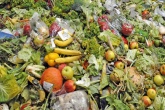Government will not force retailers to publish food waste data
Retailers will not be obliged to publish their food waste data the government has said in response to April’s ‘Food Waste in England’ report by the Environment, Food and Rural Affairs (EFRA) Committee, which recommended that more stringent action be enforced to tackle food waste.
The report claimed that a voluntary approach to reducing waste was inadequate and called for stronger mandatory actions to be rolled out for food retailers, including making it compulsory for businesses over a certain size to separate their food waste, to match measures taken by the devolved administrations in Scotland, where any business producing over 5kg of food waste a week is obliged to ensure the correct separation of that waste in line with the Waste (Scotland) Regulations, and Northern Ireland.
In response to EFRA’s suggestions, the government has reiterated its support for the Courtauld Commitment 2025, which aims for a 20 per cent reduction in food and drink waste by 2025 and is estimated to save around £20 billion during that time, while rejecting calls to force food retailers and businesses to publish their food waste data.
Signing up to the commitment is entirely voluntary, and the government’s response to EFRA’s report suggests that a similar mandatory commitment will not be introduced in the near future, despite noting: ‘We are monitoring the mandatory approach taken by Scotland and Northern Ireland in this area’.
The government also defended the reduced budget for the Waste and Resources Action Programme (WRAP) - £9.62 million for 2017/18 - stating that it continues to deliver ‘an ambitious programme being highly regarded by the business community, local authorities, non-Government organisations and others, and will continue to deliver priority projects like Courtauld 2025 and Love Food Hate Waste’.
No need for public data
The EFRA report published back in April suggested that food retailers be obliged to publish their food waste data, in order to increase transparency across the sector. In 2013, Tesco was the first UK supermarket to reveal its figures and has been something of a trailblazer for food waste reduction initiatives amongst retailers, although its latest figures show that its food waste tonnage actually rose by 9.3 per cent in 2016/17. Sainsbury’s followed suit in publishing its food waste data in 2016, but EFRA said more retailers must publish their figures for a nationwide effect to be seen.
As ‘reporting is already taking place under Courtauld’, the government suggests that the independent publication of data by businesses is unnecessary. The data collated by Courtauld is, however, anonymised, preventing individual members being held to account. The government response favours this confidentiality, claiming it will encourage collective action, but does concede that food businesses over a certain size might benefit from a Food Surplus and Waste Management Plan. Again, this would not be a requirement and currently would not be implemented outside of the Courtauld 2025 agreement, something with which EFRA has expressed disappointment.
On a wider level, the EFRA report suggested a need for a national food waste reduction target, something else Scotland has already implemented. A formal target, however, has been rejected by the English government in favour of working with local authorities to improve rates of food waste collection on a case by case basis, with advice and expertise provided by WRAP. It is stressed that it will be a matter for individual authorities to consider their local business case, and this will not involve financial incentives.
While the government underlined the importance of preventing food waste in the first place, it recognised the need to support food redistribution and estimated that some 47,000 tonnes of surplus food was redistributed by the manufacturing and retail sector in 2015.
However, fiscal incentives will not be employed to encourage food redistribution and a voluntary approach will remain in place. The government’s response cites figures claiming that the UK has seen very similar food redistribution levels to France, despite the latter employing financial incentives that the UK does not (500 tonnes per £billion of production for the UK, and 480 tonnes per £billion for France), in its support for a voluntary rather than a fiscal or legislative approach.
Improving education
The government did welcome EFRA’s note on food labelling and conceded the inadequacy of current ‘use by’ and ‘best before’ labels leading to unnecessary disposal of useable food. Part of this problem, which both the report and the response acknowledged, stems from lack of understanding about the meaning of both labels.
Notably, the government response suggested that Brexit could lead to increased flexibility and the ‘possibility to independently act’ on the appropriateness of the use of such labels, which are currently subject to EU regulations, although whether supermarkets will embrace a change is questionable: Tim Smith, Group Quality Director at Tesco, told an EFRA panel in January that ‘use by’ dates were “critical” for health reasons and ‘best before’ protected brand integrity.
The government also responded positively to EFRA’s recommendation for a consistent collection of waste and recycling, encouraging the use of the WRAP Greater Consistency Framework so that by 2025 ‘every household in England can recycle a common set of dry recyclable materials and food waste’.
However, the government was keen to stress that greater consistency was not a ‘silver bullet’. The government’s response emphasised that, aside from greater consistency, recyclability should be designed into as much packaging as possible, and labelling should be improved in order to better educate customers about recycling options.
The response can be read in full on the Parliament website.








